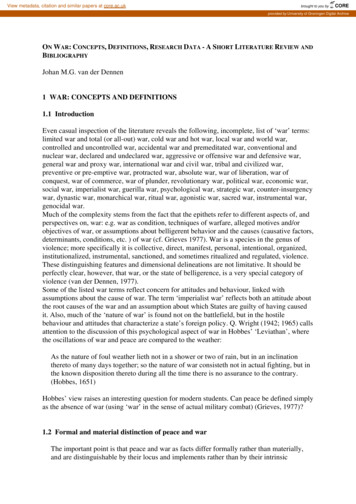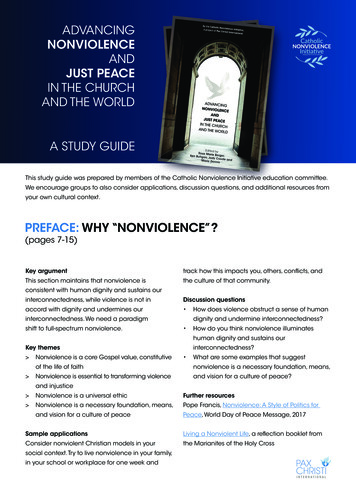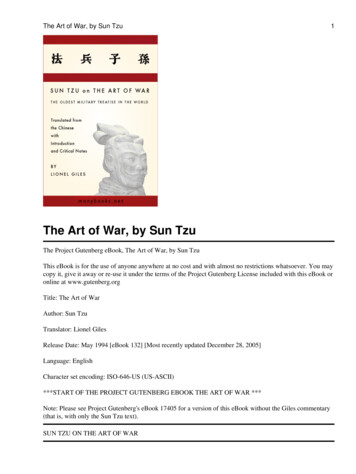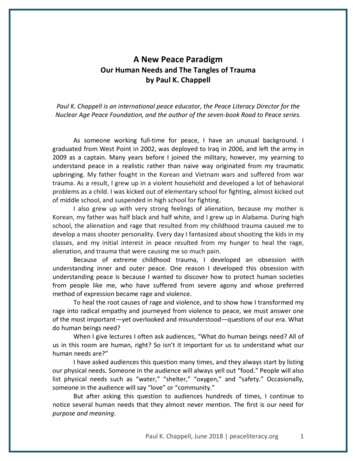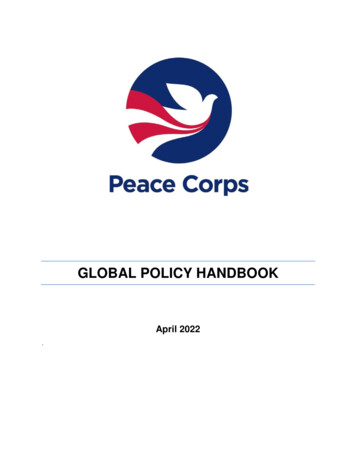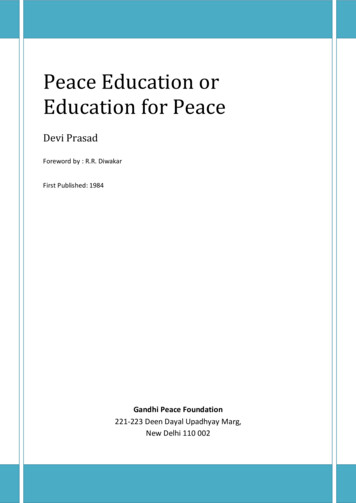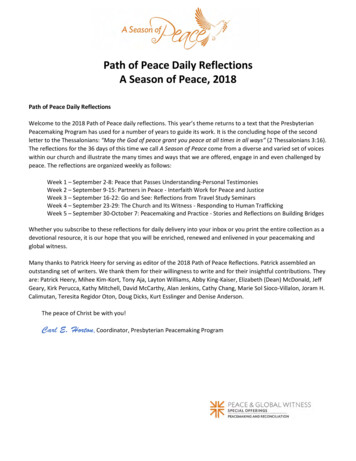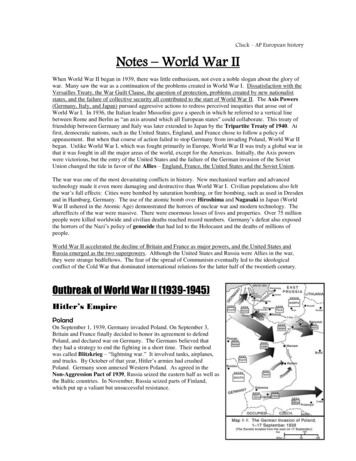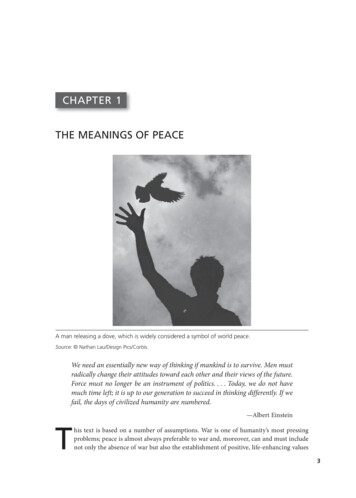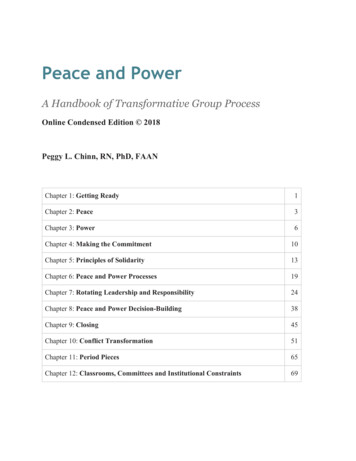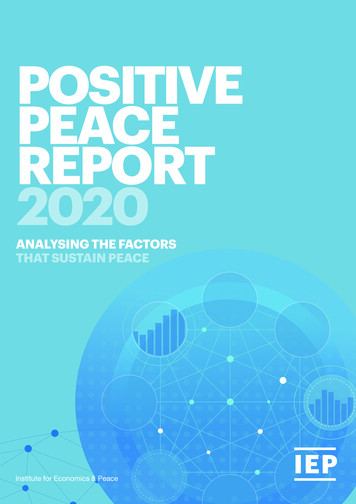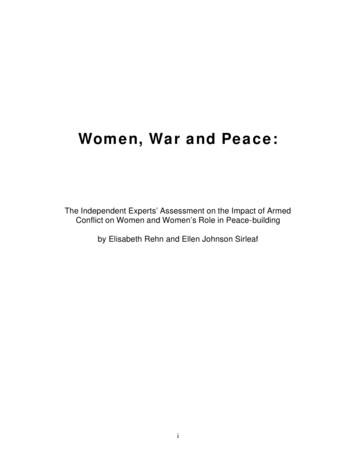
Transcription
Women, War and Peace:The Independent Experts’ Assessment on the Impact of ArmedConflict on Women and Women’s Role in Peace-buildingby Elisabeth Rehn and Ellen Johnson Sirleafi
UNIFEM is the women’s fund at the United Nations. It provides financial and technicalassistance to innovative programmes and strategies that promote women’s human rights,political participation and economic security. UNIFEM works in partnership with UNorganizations, governments and non-governmental organizations (NGOs) and networksto promote gender equality. It links women’s issues and concerns to national, regionaland global agendas, by fostering collaboration and providing technical expertise ongender mainstreaming and women’s empowerment strategies.The views expressed in this publication are those of the authors, and do not necessarilyrepresent the views of UNIFEM, the United Nations or any of its affiliated organizations.Women, War and Peace: The Independent Experts’ Assessment on the Impact of ArmedConflict on Women and Women’s Role in Peace-building [2002] United Nations Development Fund for WomenISBN: 0-912917-66-0United Nations Development Fund for Women (UNIFEM)304 East 45th Street, 15th FloorNew York, NY 10017USATel: (212) 906-6400Fax: (212) 906-6705E-mail: unifem@undp.orgWebsite: www.unifem.undp.orgEditor: Gloria JacobsPhoto Editors: Susan Ackerman and Amy FeinbergProduction: Tina JohnsonCover & book design: Kathi RotaCover photo: Musa Al-Shaer—Agence-France PressePrinter: Remlitho Inc.ii
Table of ContentsForewordvPrefaceviiKey RecommendationsxIntroduction: Peace – for whom and when?11. Violence Against WomenThe continuum of violenceTrafficking, sexual slavery and exploitationDomestic violenceChildren born of rape and sexual exploitationTowards ending impunity92. Women Forced to FleeThe responsibility to protectInternally displaced personsViolence against women in campsUrban displacementLong-term displacement193. War and the Health of WomenThe general impact of armed conflict on women’s healthDamage to health systemsInfectious diseasesInjuries and woundsEnvironmental damageMental health and stress related diseaseThe Specific effects of conflict on women’s health and well-beingMalnutritionReproductive healthEffects of sexual violence on mental healthThe Burden of care for othersWomen’s health needs: what is to be done?314. HIV/AIDSThe link between HIV/AIDS and conflictSexual violence and exploitationMilitary-civilian interactionPeacekeeping troops: vectors or victims?What can be done to protect women and stop the epidemic?475. Women and Peace OperationsBringing a gender perspective into peace operationsImproving gender balance in the staffing of peace operationsGender advisers and units: delivering the mandate to womenGender training in the peacekeeping environmentMaking a difference for women61iii
Protection and AssistanceGender responsive civilian police and rule of law teamsExploitation6. Organizing for PeaceWomen's Peace WorkGrassroots organizingOrganizing across bordersGetting to the Peace TableTraining and facilitatingQuotasRestoring the rule of law and women’s access to justiceConstitutional reformElectoral issuesJudicial reformsImplementationWhat do women need?757. JusticeThe Need for AccountabilityThe International Criminal CourtAd hoc tribunalsSpecial courts and tribunalsNational approachesTruth and reconciliation commissionsTraditional justice888. Media PowerPropaganda and censorshipWomen using media as a tool for peace1039. Prevention and Early WarningGender, information and early warningDisarmament, demobilization and reintegration (DDR)Security sector reformThe cost of investing in war rather than prevention11110. ReconstructionTransitional AidCan micro-credit make a difference?Getting it right: Alternative SolutionsStrengthening public servicesLand and livelihoodEmploymentEducation and training122Recommendations by Chapter136Endnotes143iv
ForewordAs Executive Director of UNIFEM I have witnessed the impact of conflict onwomen in many countries. In the "Valley of Widows" in Colombia, I met women whohad lost their husbands and their land – everyone and everything important to them hadbeen destroyed by civil war and drug lords. I have been to Bosnia where womendescribed abduction, rape camps and forced impregnation, and to Rwanda where womenhad been gang raped and purposely infected with HIV/AIDS. Stories like these wererepeated again and again, in different languages, in different surroundings: East Timor,the Democratic Republic of the Congo, Guatemala. Only the horror and the pain were thesame. Clearly the nature of war has changed. It is being fought in homes andcommunities – and on women's bodies in a battle for resources and in the name ofreligion and ethnicity. Violence against women is used to break and humiliate women,men, families, communities, no matter which side they are on. Women have become theworst victims of war – and the biggest stakeholders of peace.I was prepared to find bitterness and hatred among the women who hadexperienced such horrific violence and loss, and pervasive trauma, but in many places Ifound strength. I met women who had transcended their sorrow and discovered inthemselves the courage and will to rebuild their lives and communities. Many believedthe only way to stop the cycle of violence was to make security and justice key issues onthe agenda for a new, more equitable society. A few years ago in South Africa I litUNIFEM’s peace torch with African women; it was sent to other conflict areas and thento Beijing to open the Fourth World Conference on Women in 1995. The women wantedpeace, but they also wanted to be shapers of the peace process in their countries, to usetheir own suffering and transform it into a force that would build a more secure future forhumanity.That is the deeper story I want the world to know: that despite what they haveexperienced, many of the women I met have been able to rise to the challenge of buildinga sustainable peace, recognizing that the security and satisfaction of one side can never bebased on the frustration or humiliation of the other. They were women like those in EastTimor who created collectives to provide each other with emotional support as well asemployment schemes to keep their families and villages going. They have institutedliteracy classes – at the end of the war, 90 per cent of rural women were illiterate – anddemanded a role in political elections. In Sudan women from the North and the Southtook the initiative to come together across ethnic and religious divides to talk aboutbuilding peace. In Ghana women refugees from Liberia learned construction skillsthrough a UNIFEM-supported programme and built a safer camp for themselves and theirfamilies. In Afghanistan women met in secret to organize while the Taliban was inpower. They developed maps of streets and neighbourhoods where undergroundhomeschools for girls or medical help or jobs could be found, and shared them atweddings and birthdays.We cannot expect women to do all this alone. Their efforts must be recognized,valued and supported. To build peace and contribute to the rebuilding of their countries,women need resources, skills, authority. Despite the work they have done on the ground,they are not at the peace table when warring factions sit down to negotiate. No one is heldaccountable for the enormous crimes committed against women.v
Although women are feeding their families and have taken in orphans, there arecountries where they cannot inherit property or own land to farm. Their needs and theirwork are not systematically supported in the programmes developed by internationalagencies. Their rights are not enshrined in constitutions or protected by legislation. Allthis must change.Women's peace-building and reconstruction efforts must be supported, not onlybecause it is the right thing to do, but also because most nations consumed by conflictneed the strength of their women. The women are the ones who held their families andcommunities together during the worst of the fighting, even while on the run from armies.They keep a measure of stability during times of chaos and during displacement. Now, aspeace accords are negotiated and countries are rebuilt, those contributions must berecognized.I appointed Elisabeth Rehn and Ellen Johnson Sirleaf to conduct an independentassessment of women, war and peace so that people throughout the world will know andunderstand not only what women have suffered but what they have contributed. Manywho read this report will already know what has happened to women in Bosnia, EastTimor or Afghanistan, but I believe we have not recognized how pervasive violenceagainst women is during conflict and how great the need for protection and assistance.We know a little about women building peace, but we have not yet recognized women asa force for reconstruction. New responses are vital if we want this century to banish theworst brutalities of the previous one. We must invest in the progress of women from waraffected countries.This assessment could only take place because of the support of several people:Louise Fréchette, Deputy Secretary-General of the United Nations; Mark MallochBrown, Administrator of the UN Development Programme (UNDP); Jean-MarieGuéhenno, Under-Secretary-General, Department of Peacekeeping Operations (DPKO);Kieran Prendergast, Under-Secretary-General of the Department of Political Affairs(DPA); Kenzo Oshima, Emergency Relief Coordinator of the Office for the Coordinationof Humanitarian Affairs (OCHA); Thoraya Ahmed Obaid, Executive Director of the UNPopulation Fund (UNFPA); and Carolyn McAskie, Deputy Emergency ReliefCoordinator of OCHA. Throughout this project the UN system cooperated as one tosupport the visits of the independent experts and to ensure that the voices of womenwould be heard. I firmly believe that the authoritative analysis presented here will helpcreate the political will to move forward, to promote the skills, strengths and leadershipof women as they work for peace.Noeleen HeyzerExecutive DirectorUNIFEMvi
PrefaceWe were not strangers to war when UNIFEM asked us to carry out thisindependent assessment on the impact of armed conflict on women and women’s role inpeace-building. Elisabeth remembers the sound of World War II planes overhead. Shewitnessed the long rows of corpses and body parts as the mass graves of Srebrenica wereexhumed. Ellen was one of only four government ministers who escaped assassinationafter the Liberian coup of 1980. As former Defence and Finance Ministers, and asPresidential candidates, we understand the world of politics, and we have a keen sense forripe political moments. This is such a moment. This is an opportunity to improveprotection for women in armed conflict and to strengthen women’s contribution to peaceprocesses and to rebuilding their communities.Over the course of one year, during 2001 and 2002, we travelled to many of theworld’s conflicts. Focusing on the impact of armed conflict on women and women’s rolein peace building, we visited 14 areas affected by conflict: Bosnia and Herzegovina;Cambodia; Colombia; the Democratic Republic of the Congo; East Timor; the FormerYugoslav Republic of Macedonia; the Federal Republic of Yugoslavia, includingKosovo; Guinea; Israel; Liberia; the occupied Palestinian territories; Rwanda; SierraLeone and Somalia. In all of these areas, we saw how the militarization of society breedsnew levels of violence and how impunity for these crimes becomes endemic. We saw acontinuum of violence that shatters women’s lives before, during and after conflict.In retrospect, we realize how little prepared we were for the enormity of it all: thestaggering numbers of women in war who survived the brutality of rape, sexualexploitation, mutilation, torture and displacement. The unconscionable acts of depravity.And the wholesale exclusion of women from peace processes.We prepared for each visit by researching the background of the conflict anddeveloping a set of questions to guide interactions, although we often found that a lessrigid approach elicited better answers to our questions and provided more information.We have decided not to reveal the identities of those we met in order to protect themfrom reprisals. Due to fear of this kind we did not film or record our meetings withwomen’s organizations and individuals, but instead took extensive notes. Our meetingswere informal and off the record in an effort to make women as comfortable as possiblediscussing what were extremely distressing events and issues.We collected first-hand data and testimonies by meeting with women victims andsurvivors of conflict, including refugee and internally displaced women; activists; womenleaders and women’s groups; international and national non-governmental organizations(NGOs); the media; religious organizations; eminent leaders from civil society; andwomen and girls directly involved in armed conflicts and peace processes. We metwomen in their offices and homes, at health clinics, in refugee camps, on the street, inbars and restaurants. We also met with representatives of United Nations agencies, bothat headquarters and in the field, as well as with host governments, opposition groups andpeacekeeping and humanitarian personnel to find out what they are doing for women andhow they were approaching gender issues.In addition to field-based interviews and information collection, we relied onresearch and analysis from human rights groups and civil society, independent reportsand UN documents. These provided useful analyses and raised policy issues thatvii
underscored what women themselves identified as priorities. While our goal was to focuson the testimonies of women we met during our visits, we wanted to demonstrate thattheir experiences are not country-specific, but global. Many of the trends we saw areuniversal phenomena, which is why we included a number of examples from places wecould not visit.In our report, we introduce you to many of the women we met: Chantal from aUNHCR transit camp in Goma, Democratic Republic of the Congo; Lam, a 15-year-oldVietnamese girl in a woman’s shelter in Phnom Penh, Cambodia; and a prize-winningjournalist from Colombia who fled her country after receiving death threats. We sharetheir stories to show the reality of war for women and to give a human face to thestruggle for security. We have concluded that the standards of protection for womenaffected by conflict are glaring in their inadequacy, as is the international response. Onlyby ending impunity for crimes against women in war can nations be rebuilt. Genderequality in this context means enabling women as full citizens, as voters, as candidates,as decision-makers. It means supporting women’s centrality to reconstruction – toreforming the constitution, the electoral system, and the policies and resources thatsupport development. Without women's representation – without half the population – nocountry can truly claim to be engaged in democratic development and participatorygovernance.This glimpse of bitter reality is shadowed by the deadly nexus of HIV/AIDS andarmed conflict for women. It is fueled by the economies of war, relief and reconstruction.Women do not receive what they need in emergencies, for development, peace-building,or reconstruction. Their entreaties for education and health care go largely unanswered.In short, women and their organizations need more resources. At all levels – from thegrass roots to the international – women’s organizations continue to be insufficientlyrecognized and supported.But our report also shows many ways in which women in conflict situations arebeing supported. A large number of United Nations agencies and many international andlocal non-governmental organizations are protecting women and supporting their role inpeace-building. We maintain, however, that this excellent work needs to be amplifiedexponentially.We are proud to pay tribute, in this report, to the courageous peacekeepers andhumanitarian workers on the front lines and to showcase new models of protection forwomen in a peacekeeping environment. We are encouraged that civilian police areworking to protect women from domestic violence and, in some cases, to prevent it. Weare gratified to see peace operations support HIV/AIDS awareness. But we were alsoappalled by reports of flagrant violations committed against women by those with theduty to protect them. We support fully Secretary-General Kofi Annan’s position thatthere must be zero tolerance and full accountability for these crimes. We take note of therecent report of the UN Office for Internal Oversight (OIOS) on sexual exploitation andefforts underway across the humanitarian community to strengthen measures forprotection from sexual exploitation and abuse in humanitarian crises.We direct our findings and conclusions to those with the power and resources tomake a difference. Indifference is not an option. In representing women’s experience ofwar we have paid attention to causes and consequences. But for each woman, thechallenges, obstacles and opportunities are different. We accept full responsibility for ourviii
conclusions – their merits and their shortcomings. They do not represent the position ofUNIFEM whose courage we salute in commissioning this long overdue assessment. Wepay special thanks to Noeleen Heyzer, UNIFEM Executive Director, for financing andcreating the political space for this report and for shepherding it through difficultchallenges to completion. We also owe thanks to Jennifer Klot, the Senior Adviser of theGovernance, Peace and Security section at UNIFEM for identifying the need for thisreport and her inspired leadership of the secretariat.We are indebted to the experts who provided research specifically commissionedfor this assessment. Radhika Coomaraswamy, the UN Special Rapporteur on violenceagainst women, helped us understand the nature of sexual violence and exploitation inarmed conflict. Angela M. Wakhweya, Catherine A. Rielly, Monica Onyango and GailHelmer at the Center for International Health at Boston University conducted valuableresearch on the intersection of gender, HIV/AIDS and conflict, and Professor DonnaSullivan of New York University School of Law provided much needed guidance on thepursuit of justice and accountability for gender-based war crimes in post-conflictreconstruction. We also owe thanks to Victoria Brittain for her touching and insightfulcontributions.We have relied enormously on the guidance of our Advisory Group, composed ofeminent women and men from all regions of the globe whose expertise includes peacesupport operations, humanitarian assistance, human rights and peace building. Theirencouragement, support, knowledge and sheer intelligence have been invaluable to ourwork. In this regard, our thanks go to Rafeeuddin Ahmed, Winnie Byanyima, Isha Dyfan,Asma Jahangir, Stephen Lewis, Jane Holl Lute, Luz Mendez, Faiza Jama Mohamed,Maha Muna, Milena Pires, Maj Britt Theorin and Stasa Zajovic.We would also like to thank the many experts we consulted – too numerous tomention by name – who offered advice, information and encouragement. We are gratefulfor the support of the secretariat staff from UNIFEM, Aina Iiyambo, Sumie Nakaya,Felicity Hill, Gaella Mortel, Liliana Potenza and Karen Judd. We are thankful to MaaritKohonen who was seconded from the Office of the High Commissioner for HumanRights; she helped get this initiative off the ground and continued to provide substantiveinput. Saudimini Siegrist of UNICEF generously provided insight and expertise. PamDeLargy from the United Nations Population Fund (UNFPA) joined us in our fieldmission to West Africa and worked closely with the secretariat. We owe her and her staffan enormous debt for their invaluable advice and contributions to our analysis of the linksacross gender, HIV/AIDS, conflict and health and for UNFPA’s financial contribution toour work. Our security adviser, Heljo Laukkala, was a great help during our visits. Wewould also like to thank the United Nations Development Programme (UNDP), theDepartment of Peacekeeping Operations (DPKO) and the Department of Political Affairs(DPA) for their direct support of our work. We express our deepest respect andappreciation to the courageous humanitarians in the field who went far beyond the call ofduty to help us in so many ways.Finally, we thank the women who inspired this report, who have committed theirlives to peace and justice, for which they have waited too long.Elisabeth Rehn and Ellen Johnson SirleafOctober 2002ix
Toward the full implementation of Security Council Resolution 1325,the Independent Experts call for:1. An international Truth and Reconciliation Commission on violence against women inarmed conflict as a step towards ending impunity. This Commission, to be convened by civilsociety with support from the international community, will fill the historical gap that has leftthese crimes unrecorded and unaddressed.2. Targeted sanctions against trafficking of women and girls. Those complicit must be heldaccountable for trafficking women and girls in or through conflict areas. Existing internationallaws on trafficking must be applied in conflict situations and national legislation shouldcriminalize trafficking with strong punitive measures, including such actions as freezing theassets of trafficking rings. Victims of trafficking should be protected from prosecution.3. Strengthening of United Nations field operations for internally displaced women, andthose bodies that support a field-based presence. Protection officers from all relevant bodies,including the Office of the High Commissioner for Refugees (UNHCR), the Office of the HighCommissioner for Human Rights (OHCHR), the Office for the Coordination of HumanitarianAffairs (OCHA), the United Nations Children’s Fund (UNICEF) and the International Committeeof the Red Cross (ICRC), should be deployed immediately if a State cannot or will not protectdisplaced populations or is indeed responsible for their displacement.4. Psychosocial support and reproductive health services for women affected by conflict tobe an integral part of emergency assistance and post-conflict reconstruction. Specialattention should be provided to those who have experienced physical trauma, torture and sexualviolence. All agencies providing health support and social services should include psychosocialcounselling and referrals. The United Nations Population Fund (UNFPA) should take the lead inproviding these services, working in close cooperation with the World Health Organization(WHO), UNHCR, and UNICEF.5. All HIV/AIDS programmes and funding in conflict situations to address thedisproportionate disease burden carried by women. Mandatory gender analysis and specificstrategies for meeting the needs of women and girls should seek to prevent infection and increaseaccess to treatment, care and support.6. Gender experts and expertise to be included in all levels and aspects of peace operations,including in technical surveys, the design of concepts of operation, training, staffing andprogrammes. To this end, a Memorandum of Understanding should set out the roles andresponsibilities among DPKO, Department of Political Affairs (DPA), UNIFEM and the Divisionfor the Advancement of Women (DAW).7. A review of training programmes on and approaches to the gender dimensions of conflictresolution and peace-building for humanitarian, military and civilian personnel. UnitedNations entities active in this area should lead this process with support provided by the SpecialAdvisor on Gender Issues and Advancement of Women and the Task Force on Women, Peaceand Security with a view to developing guidance on training policy and standards.8. The Secretary-General, in keeping with his personal commitment, to increase thenumber of women in senior positions in peace-related functions. Priority should be given toachieving gender parity in his appointment of women as Special Representatives and Envoys,beginning with the minimum of 30 per cent in the next three years, with a view to gender parityby 2015.x
9. Gender equality to be recognized in all peace processes, agreements and transitionalgovernance structures. International, regional organizations and all participating partiesinvolved in peace processes should advocate for gender parity, maintaining a minimum 30 percent representation of women in peace negotiations, and ensure that women’s needs are taken intoconsideration and specifically addressed in all such agreements.10. A United Nations Trust Fund for Women’s Peace-building. This Trust Fund wouldleverage the political, financial and technical support needed for women’s civil societyorganizations and women leaders to have an impact on peace efforts nationally, regionally andinternationally. The Fund should be managed by the United Nations Development Fund forWomen (UNIFEM), in consultation with other UN bodies, and women’s civil societyorganizations.11. UNIFEM to work closely with the Department of Political Affairs (DPA) to ensure thatgender issues are incorporated in peace-building and post-conflict reconstruction in orderto integrate gender perspectives in peace-building and to support women’s full and equalparticipation in decision-making, and for the UN Population Fund (UNFPA) to strengthenits work in emergency situations in order to build women’s capacity in conflict situations.UNIFEM and UNFPA should be represented in all relevant inter-agency bodies.12. The Secretary-General to appoint a panel of experts to assess the gaps in internationaland national laws and standards pertaining to the protection of women in conflict and postconflict situations and women’s role in peace-building.13. Increased donor resources and access for women to media and communicationstechnology, so that gender perspectives, women’s expertise and women’s media caninfluence public discourse and decision-making on peace and security.14. The Secretary -General to systematically include information on the impact of armedconflict on women, and women’s role in prevention and peace-building in all of his countryand thematic reports to the Security Council. Towards that end, the Secretary-General shouldrequest relevant information from UN operations and all relevant bodies.15. The systematic collection and analysis of information and data by all actors, usinggender specific indicators to guide policy, programmes and service delivery for women inarmed conflict. This information should be provided on a regular basis to the secretariat, memberstates, inter-governmental bodies, regional organizations, NGOs and other relevant bodies. Acentral knowledge base should be established and maintained by UNIFEM together with anetwork of all relevant bodies, in particular the Department of Political Affairs (DPA).16. The Security Council to formulate a plan for the least diversion for armaments of theworld’s human and economic resources. Sixty years after being assigned the task, the SecurityCouncil should implement Article 26 of the United Nations Charter, taking into account theWomen’s Peace Petition which calls for the world’s nations to redirect at least 5 per cent ofnational military expenditures to health, education and employment programmes each year overthe next five years.17. The UN Development Programme (UNDP), as the leading agency in the field of securitysector reform, to ensure that women’s protection and participation be central to the designand reform of security sector institutions and policies, especially in police, military and rule oflaw components. UNDP should integrate a gender perspective into its country programmes.xi
18. Operational humanitarian, human rights and development bodies to develop indicatorsto determine the extent to which gender is mainstreamed throughout their operations inconflict and post-conflict situations and ensure that ‘gender mainstreaming’ producesmeasurable results and is not lost in generalities and vague references to gender. Measures shouldbe put in place to address the gaps and obstacles encountered in implementation.19. Gender budget analysis of humanitarian assistance and post-conflict reconstruction toensure that women benefit directly from resources mobilized through multilateral and bilateraldonors, including the Consolidated Appeals Process, the Bretton Woods Institutions and donorconferences.20. Establishment of macroeconomic policies in post-conflict reconstruction that prioritizethe public provision of food, water, sanitation, health and energy, the key sectors in whichwomen provide unpaid labour. Special attention should be paid to the consequences for womenof decentralization policies.21. A lead organization to be designated within the United Nations for women’s educationand training in conflict and post-conflict situations. This lead organization, together withUNESCO, UNHCR and UNICEF, should ensure that all education programmes for displacedpersons provide for women as well as girls.22. The Security Council, the General Assembly and ECOSOC to give serious considerationto the above recommendations and adopt relevant decisions to operationalize them. TheSecretary-General should thereafter formulate an implementation plan addressing each of therecommendations contained in those decisions and submit an annual report to the SecurityCouncil and all relevant bodies on the progress made and obstacles encountered inimplementation.xii
IntroductionPeace – For Whom and When?As we write this, in the summer of 2002, it is hard to imagine a world without war. Everyday, we hear reports of new conflicts and old grievances, of escalating tension andviolence. During our missions to conflict situations, we met generations of women andgirls who have known nothing other than war. Many were gripped by fear and anger;others had learned to dull their feelings with
peace accords are negotiated and countries are rebuilt, those contributions must be recognized. I appointed Elisabeth Rehn and Ellen Johnson Sirleaf to conduct an independent assessment of women, war and peace so that people throughout the world will know and understand not only what women have suffered but what they have contributed. Many
